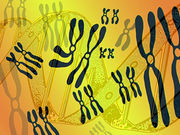Technique, performed in a hospital-based laboratory, offers timely results
TUESDAY, May 31, 2016 (HealthDay News) — Next-generation sequencing may greatly improve a physician’s ability to quickly diagnose rare genetic diseases in newborns, according to research published online May 30 in CMAJ, the journal of the Canadian Medical Association.
The test used includes all of the 4,813 genes currently known to be linked with rare diseases. David Dyment, M.D., of the Children’s Hospital of Eastern Ontario in Ottawa, and colleagues assessed the diagnostic potential in 20 newborns being treated in neonatal intensive care units (NICUs) for a wide range of medical issues. Half of the infants had neurological symptoms, such as seizures or hypotonia.
The gene sequencing panel provided a molecular diagnosis for eight of the infants (40 percent). For two of the patients, their diagnoses directly affected their medical care, the study authors said.
“Next-generation sequencing has the potential to transform the practice of clinical genetics rapidly,” Dyment and colleagues write. “In particular, newborns admitted to the NICU with rare and complex diseases may benefit substantially from a timely molecular diagnosis through next-generation sequencing.”
Copyright © 2016 HealthDay. All rights reserved.








